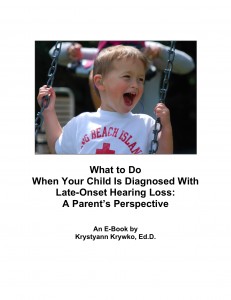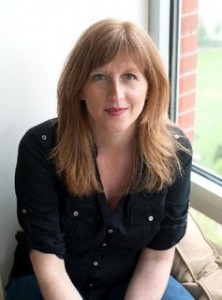
Do you know any parents whose children have been diagnosed with late-onset hearing loss?
If so, I’d like to introduce you to Krysty Krywko, a mom and education expert whose son was almost three years old by the time he received his diagnosed of late-onset hearing loss.
Krysty soon learned that there was a tremendous gap between her son’s development and that of other three-year olds.
When her son was first tested for speech and language development, he tested at the level of an eighteen-month old – potentially devastating news for any parent.
This month, Kysty’s son is five years old, and after spending the past two years at the Clarke School for Hearing & Speech in Manhattan, he joins a mainstream kindergarten class.
And, like one diagnosis wouldn’t be challenging enough for any family, Krysty was also diagnosed with hearing loss shortly after the birth of her son.
Kysty is launching her first e-book today, What To Do When Your Child Is Diagnosed With Late-Onset Hearing Loss: A Parent’s Perspective. Kysty’s e-book offers a “from the trenches” perspective that will walk parents whose child is diagnosed with late-onset hearing loss through the emotions involved from the moment of diagnosis.
I hope you will share this valuable resource with any parents you know, when you learn that their children have been diagnosed and they need a veteran parent’s perspective. Thanks so much for your support.
 Krysty, it sounds like you first realized that late-onset hearing loss might be a topic that other parents would want to learn more about when it started to happen in your family — twice. What was that like?
Krysty, it sounds like you first realized that late-onset hearing loss might be a topic that other parents would want to learn more about when it started to happen in your family — twice. What was that like?
It really hit me completely off guard – both times! With my son I honestly thought he just had a speech delay, at the time I never made the connection between hearing loss and a speech delay. It of course seems so obvious now. With myself I knew I was having some difficulties hearing, I started noticing it shortly after the birth of my son, but again thought it would be no big deal.
In the beginning with my son it was pretty devastating – it’s just really difficult to have someone tell you that something is not right with your child’s development.
As you responded to your son’s and then your diagnosis, what stands out that you learned that you think other parents will want to learn more about?
The main thing that stands out is really that hearing loss can happen to anyone at anytime and that there shouldn’t be a stigma attached to wearing hearing aids, or other devices. It is estimated that there are about 29 million people in the United States who are deaf and/or hard of hearing. If people were made more aware of the importance of hearing then I think you would see more of them going for appropriate treatments and would see more assistive listening devices, such as hearing aids, being worn.
What’s typically the biggest dilemma for families after there has been a diagnosis in the family of late-onset hearing loss?
I am not really sure if you can call it a dilemma, but the biggest issue revolves around the family accepting the diagnosis and moving forward with getting their child the help they need – whether that road leads to hearing aids, cochlear implants, Baha devices, along with an intensive therapy program. Around 90 percent of children who are diagnosed with hearing loss are born to hearing parents. This means that those families often have not had any exposure to children and/or adults who have hearing loss. At the moment of diagnosis while there is some relief to understanding your child’s development there is also a feeling of complete devastation. This feeling is based in frustration and stems from simply knowing very little about hearing loss and how it will impact their child. I wrote my e-book to address this issue of frustration and helplessness and I really think it will help parents adjust to parenting a child with hearing loss.
If you were sitting down face-to-face with parents of a child who had just been diagnosed with late-onset hearing loss, what would you say to them?
First of all I would tell them to grieve, that it’s okay. That is what they need to do, to experience their feelings and emotions. Then I would tell them that it is going to be okay. That there are strengths within both themselves and their child that they don’t even know about yet and the important thing is to get their child the therapy and assistive listening devices that they need to be successful.
Which part of spreading a helpful message about late-onset hearing loss is your favorite part of the process?
My favorite part of the process is when I get the chance to help clear away some of the myths about hearing loss. There is absolutely no shame in losing your hearing – it’s just life. Hearing loss can happen at any age. In my opinion, the wearing of hearing aids or cochlear implants to correct your hearing loss is no different than wearing glasses to correct your vision loss.
Have there been any silver linings in your journey in dealing with late-onset hearing loss as a family?
The first silver lining has been watching my son blossom. There were many times, both pre-diagnosis and in the early stages after his diagnosis, when I honestly wondered if I would ever really know anything about my son. How could I access his thoughts if he wasn’t able to speak? But today, I am so thankful that he is now able to share his wicked sense of humor and his daily observations of his world with us. The second silver lining is the fact that we have really been given an opportunity to help educate those who are not familiar with issues of hearing loss.
You can learn more about Krysty’s helpful, comforting book, What To Do When Your Child Is Diagnosed With Late-Onset Hearing Loss: A Parent’s Perspective at her website, Krystyann Krywko, Ed. D.
Thanks for helping me support Krysty’s e-book launch. I’d love it if you’d help spread the word about What To Do When Your Child Is Diagnosed With Late-Onset Hearing Loss: A Parent’s Perspective.
Comments on this entry are closed.
Krysty, you handled it well. It’s hard to know what’s going on when you’ve never experienced it before. I was lucky to be the youngest of three, so my parents recognized something was going on when I didn’t respond until they were in front of me.
They also “grieved” — took a long walk when they received the news, and then went to work in getting me the help I needed. Even a sibling blamed herself because she was almost a teen by the time I was born and worried about having to be quiet with a new baby in the house.
Thanks for sharing your story!
very interesting! thanks for sharing!
While not having an experience of this as Meryl has, myself, I want to thank you, too, Krysty (and Christina for bringing it to us). Just so folks can find you on Twiiter, I thought I’d add your Twitter handle here: @EdWriter or http://www.twitter.com/EdWriter Thanks again and all the best to your son, and with your book.